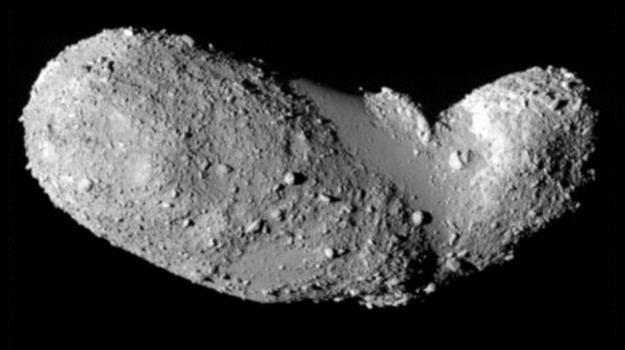Here I come again!
-
Keep hope alive!
https://gizmodo.com/asteroid-apophis-remains-a-threat-to-hit-earth-in-2068-1845496002
Say hello to my little friend:

=-=-=-=-=-=-=-=-=
Only a small handful of objects are known to pose a serious threat to Earth, and the gigantic asteroid Apophis is one of them. Scientists are now re-evaluating its potential to strike our planet in 48 years, owing to improved observations of the problematic asteroid.Observations made earlier this year from the Subaru Telescope in Hawai’i are providing astronomers with a better sense of how the Yarkovsky effect is influencing the orbital path of asteroid 99942 Apophis. This effect is like a built-in propulsion system for asteroids, in which trace amounts of leaking radiation can alter an object’s momentum in space, causing it to drift ever-so-slightly from the path otherwise chosen by gravity.
“Without taking Yarkovsky drift into account, Apophis is still a threatening object, just not in 2068,” Dave Tholen, a researcher from the Institute for Astronomy at the University of Hawai’i and a co-author of the pending study, explained in an email. “With Yarkovsky taken into account, the 2068 impact scenario is still in play. Small, but non-zero.”
Tholen, along with Davide Farnocchia from NASA’s Jet Propulsion Laboratory, crunched the new numbers, finding that Yarkovsky acceleration is keeping the Apophis threat inside the 2068 window. Their findings are laid out in new research presented at the 2020 virtual meeting of the Division for Planetary Sciences of the American Astronomical Society.
Apophis currently owns the title of third-highest threat on NASA’s Sentry Risk Table. The estimate on the Palermo Technical Impact Hazard Scale suggests there’s a 1 in 150,000 chance of Apophis hitting Earth on April 12, 2068 (mark your calendars). Or, if you prefer percentages, that’s a 0.00067% chance of Earth impact. Tholen said the odds are actually closer to 1 in 530,000, a figure used by the NEODyS impact monitor service, which includes a nominal Yarkovsky drift rate. The new analysis will result in a revised threat risk for Apophis, but even then, Tholen said we’ll need “to be careful with this calculation,” as there will be other variables to consider. And indeed, we should expect to see the odds change over time as astronomers get a better handle on this asteroid’s itinerary.
-
Sorry, but my vote is for Cthulhu. Why vote for the lesser evil?

-
Keep hope alive!
https://gizmodo.com/asteroid-apophis-remains-a-threat-to-hit-earth-in-2068-1845496002
Say hello to my little friend:

=-=-=-=-=-=-=-=-=
Only a small handful of objects are known to pose a serious threat to Earth, and the gigantic asteroid Apophis is one of them. Scientists are now re-evaluating its potential to strike our planet in 48 years, owing to improved observations of the problematic asteroid.Observations made earlier this year from the Subaru Telescope in Hawai’i are providing astronomers with a better sense of how the Yarkovsky effect is influencing the orbital path of asteroid 99942 Apophis. This effect is like a built-in propulsion system for asteroids, in which trace amounts of leaking radiation can alter an object’s momentum in space, causing it to drift ever-so-slightly from the path otherwise chosen by gravity.
“Without taking Yarkovsky drift into account, Apophis is still a threatening object, just not in 2068,” Dave Tholen, a researcher from the Institute for Astronomy at the University of Hawai’i and a co-author of the pending study, explained in an email. “With Yarkovsky taken into account, the 2068 impact scenario is still in play. Small, but non-zero.”
Tholen, along with Davide Farnocchia from NASA’s Jet Propulsion Laboratory, crunched the new numbers, finding that Yarkovsky acceleration is keeping the Apophis threat inside the 2068 window. Their findings are laid out in new research presented at the 2020 virtual meeting of the Division for Planetary Sciences of the American Astronomical Society.
Apophis currently owns the title of third-highest threat on NASA’s Sentry Risk Table. The estimate on the Palermo Technical Impact Hazard Scale suggests there’s a 1 in 150,000 chance of Apophis hitting Earth on April 12, 2068 (mark your calendars). Or, if you prefer percentages, that’s a 0.00067% chance of Earth impact. Tholen said the odds are actually closer to 1 in 530,000, a figure used by the NEODyS impact monitor service, which includes a nominal Yarkovsky drift rate. The new analysis will result in a revised threat risk for Apophis, but even then, Tholen said we’ll need “to be careful with this calculation,” as there will be other variables to consider. And indeed, we should expect to see the odds change over time as astronomers get a better handle on this asteroid’s itinerary.
-
@Sweet-Meteor after 65 million years of dry spell ... hope springs eternal, right?
-
Keep hope alive!
https://gizmodo.com/asteroid-apophis-remains-a-threat-to-hit-earth-in-2068-1845496002
Say hello to my little friend:

=-=-=-=-=-=-=-=-=
Only a small handful of objects are known to pose a serious threat to Earth, and the gigantic asteroid Apophis is one of them. Scientists are now re-evaluating its potential to strike our planet in 48 years, owing to improved observations of the problematic asteroid.Observations made earlier this year from the Subaru Telescope in Hawai’i are providing astronomers with a better sense of how the Yarkovsky effect is influencing the orbital path of asteroid 99942 Apophis. This effect is like a built-in propulsion system for asteroids, in which trace amounts of leaking radiation can alter an object’s momentum in space, causing it to drift ever-so-slightly from the path otherwise chosen by gravity.
“Without taking Yarkovsky drift into account, Apophis is still a threatening object, just not in 2068,” Dave Tholen, a researcher from the Institute for Astronomy at the University of Hawai’i and a co-author of the pending study, explained in an email. “With Yarkovsky taken into account, the 2068 impact scenario is still in play. Small, but non-zero.”
Tholen, along with Davide Farnocchia from NASA’s Jet Propulsion Laboratory, crunched the new numbers, finding that Yarkovsky acceleration is keeping the Apophis threat inside the 2068 window. Their findings are laid out in new research presented at the 2020 virtual meeting of the Division for Planetary Sciences of the American Astronomical Society.
Apophis currently owns the title of third-highest threat on NASA’s Sentry Risk Table. The estimate on the Palermo Technical Impact Hazard Scale suggests there’s a 1 in 150,000 chance of Apophis hitting Earth on April 12, 2068 (mark your calendars). Or, if you prefer percentages, that’s a 0.00067% chance of Earth impact. Tholen said the odds are actually closer to 1 in 530,000, a figure used by the NEODyS impact monitor service, which includes a nominal Yarkovsky drift rate. The new analysis will result in a revised threat risk for Apophis, but even then, Tholen said we’ll need “to be careful with this calculation,” as there will be other variables to consider. And indeed, we should expect to see the odds change over time as astronomers get a better handle on this asteroid’s itinerary.
@Sweet-Meteor said in Here I come again!:
chance of Apophis hitting Earth on April 12, 2068 (mark your calendars)
There's goes your chance of making it to 118...
